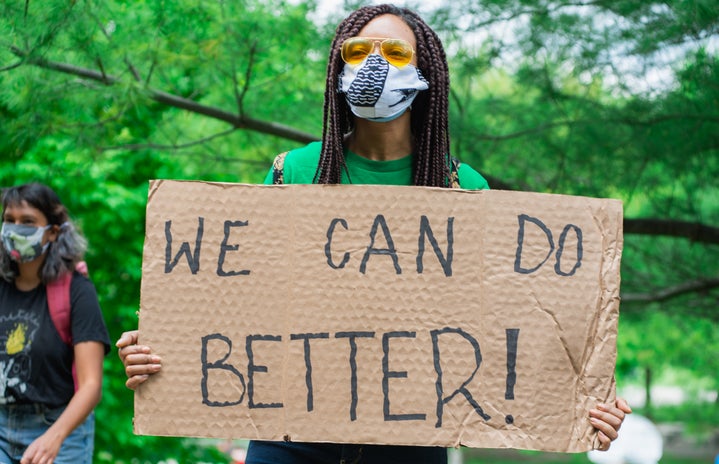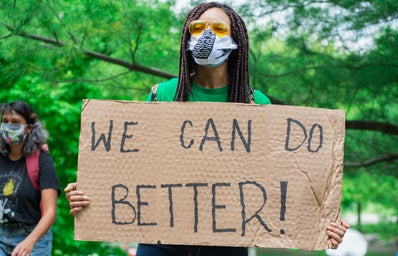In 2018, The 1975 released the song “Love it if we made it.” The song captured lead singer Matty Healy’s outlook on the social and political landscape of 2018, including commentary on Donald Trump, the Middle Eastern refugee crisis and the spread of misinformation. Throughout the song, he addresses many of the social and political issues that were present at the time, repeating the chorus, “I’d love it if we made it,” as a cry for hope and a brighter future.
When The 1975 toured in 2022, four years after “Love it if we made it” was initially released, Matty Healy introduced the song by saying, “Honestly I didn’t wanna still be playing this song in 2022…the point of the next song was not to have to play it in 2022…but here we are, how are you feeling?”
Here we are in 2024, six years since the song’s debut. How are we feeling? Here’s a brief reflection of some of The 1975’s lyrics from 2018 and their relevance to 2024.
“We’re f*ck*ng in a car, shooting h*r**n / Saying controversial things just for the hell of it”
The stark first line of the song captures the state of the world, where everything is designed to grab your attention, regardless of its accuracy. In 2018, when the song was released, this observation was brought alive by the rise of major media outlets, Tiktok and advertising in general. It remains relevant in today’s content-saturated environment, as we’re exposed to an overwhelming flood of information. Social media outlets often promote attention-grabbing content, which doesn’t always overlap with the truth.
Take TikTok for instance, a platform where sometimes people will exaggerate, fabricate or provoke their audiences with the intention of going viral. Creators like Sophia La Corte have risen to fame by leaning into controversies, making bold claims (that are sometimes untrue) or simply by saying out-of-pocket things to push people’s buttons for one sole reason: to get noticed. I bring up Sophia La Corte because not only has she grown her platform, she has monetized embodying the persona of the “internet’s villain.” She, like much of society, is in on the game; she has channeled all the negative attention towards her, which is attention nonetheless, to make her platform profitable. It doesn’t matter if what she says is untrue, biased or a crazy over exaggeration, she’s captured your attention.
La Corte is just one example of how this kind of behavior thrives in digital culture today. Healy pointed this out in 2018, but the phenomenon has only continued to flourish in 2024. Digital culture rewards the attention factor, and oftentimes, shock value is prioritized over substance. It’s nearly impossible to distinguish between entertainment, information and branding in this new digital age. The race for attention has exploded in the six years since the song was released and become an unavoidable aspect of navigating digital culture.
Healy mockingly uses the same rhetoric in the first line of the song, wryly designed to grab your attention, regardless of its truth.
“‘I moved on her like a b*tch,’ / Excited to be indicted”
The line “‘I moved on her like a b*tch’” is an infamous quote from Donald Trump, said during a 2005 conversation with Billy Bush. During the conversation, Trump bragged about his sexual advances towards women, highlighting his lack of respect for women and consent. This comment became notorious during the 2016 election because never before had there been a presidential candidate publicly making such vulgar comments.
Then, in his indictment, Trump faced 34 counts of falsifying business records related to a series of payments to cover up his relationship with Stormy Daniels. These attempts to eliminate his extramarital affair surfaced during his presidency, making Trump the first commander in chief to face criminal charges. Time and time again, Trump has said or done dishonorable things, but continues to face no real consequences. In 2018, Healy’s line, “Excited to be indicted” alluded to this notion; Healy stating, “He doesn’t care! If he got indicted, he’d be able to play more golf.” For a man of Trump’s power and privilege, an indictment doesn’t mean punishment, or, really, anything at all.
Fast forward to today, despite being found guilty on 34 charges and continuing to make misogynistic comments, Trump not only avoided the typical political fallout, but was re-elected back into office. The indictments, charges and comments meant nothing to the majority of Americans when voting in this last election. Trump’s example reinforces the idea that the legal and political system can operate differently for individuals with significant wealth, power and influence, allowing them to live above the law.
“Truth is only hearsay / We’re just left to decay, modernity has failed us”
In the first line, Healy highlights that “we’ve gotten to a point where the truth isn’t the truth anymore,” as more and more people are choosing to believe in what aligns with their personal worldviews, regardless of the weight of scientific evidence. The truth is only relevant if it favors your beliefs, and therefore it “is only hearsay.” The second line showcases how we have entered an age where we are so lucky to be surrounded by all the information in the world, but we are failing to use it correctly.
In an interview with Genius Lyrics in 2018, Matty Healy brings up the flat Earth phenomenon as an example of ideas arising despite “physical, tangible evidence.” The flat Earth phenomenon is a conspiracy that blew up on the internet claiming that “the Earth is a flat disc, and that evidence that it is round […] are an elaborate hoax involving multiple governments” despites centuries of evidence proving that the Earth is round.
In today’s day and age, conspiracies against climate change have erupted on the internet, with many claiming that it is a hoax. Many people refuse to believe that global warming is a result of human actions, despite overwhelming scientific evidence. Some are even claiming that natural disasters, like Hurricane Helene, were caused by governmental weather technologies. We are continuing to become more and more equipped with knowledge of how to solve issues like climate change, but misinformation and belief in baseless conspiracies have undermined these initiatives.
“Love it if we made it”
Despite all the current political and social issues outlined in the song, the chorus speaks to a feeling of hope for something better. The repeated chorus serves as a form of resigned optimism. Healy expresses his hope for something better, but doesn’t do it with much enthusiasm.
Fast forward to 2024, and the lyrics remain as true as ever. The re-election of Donald Trump coupled with the constant spread of misinformation have exacerbated the original issues “Love it if we made it” was originally written about. But just as these issues have progressed up to this point, so has the unwavering hope that progress is achievable. The chorus, “Love it if we made it” still remains true and serves as a reminder that there can be a future full of change.


